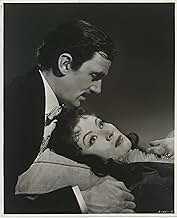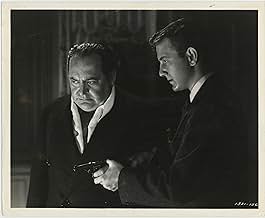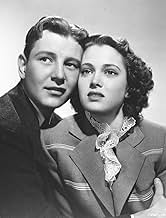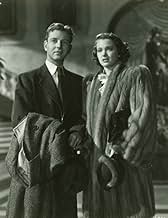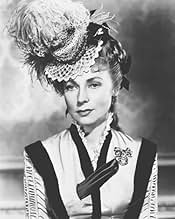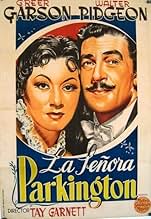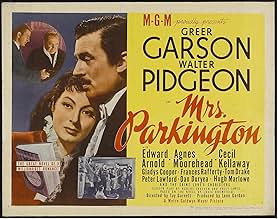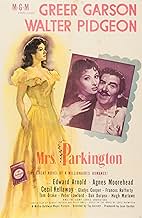A widowed matriarch reminisces about her family fortunes, including her romance with a financier/mine owner.A widowed matriarch reminisces about her family fortunes, including her romance with a financier/mine owner.A widowed matriarch reminisces about her family fortunes, including her romance with a financier/mine owner.
- Nominated for 2 Oscars
- 4 wins & 3 nominations total
St. Luke's Episcopal Church Choristers
- Carolers
- (as Saint Luke's Choristers)
Featured reviews
"Mrs. Parkington" is an incredibly well made film--with great acting and some lovely production values. Clearly, MGM gave this film the full glossy studio treatment. And, for her wonderful performance, Greer Garson was nominated for an Oscar. However, I am very ambivalent about the film because so many of the characters are either despicable or pathetic. In many ways, it reminds me of the country music song "Stand By Your Man"--as a woman should put up with ANYTHING in order to keep even the most awful man. Clearly, this is a film for dependent personalities!
The film begins near the present time. The Parkington family appears to be made up of a group of sociopaths--all loathsome jerks who think mostly of themselves. When the matriarch, Mrs. Parkington (Garson) learns that one of the brood is a thief, she begins to reminisce--remembering her life with Mr. Parkington (Walter Pidgeon). At first, their marriage seems pretty nice--with a rich and doting husband. However, through the course of these long series of flashbacks, you learn that Mr. Parkington is vindictive, petty, selfish and cheats on Mrs. Parkington. And, as for Mrs. Parkington, she is clever and long-suffering--and lifted up as some sort of shining example. I couldn't help but think she was pathetic and would have probably accepted Mr. Parkington back after he murdered or slept with children or sheep. And this brings me to my ambivalence--no one--not anyone in this family is likable in the least. And, the film seems to promote the notion that a woman's job is just to put up with this and smile throughout! Talk about an anti-feminist message! The bottom line is that I'd hate for my daughters to watch such a film, as I'd hate to think that Mrs. Parkington is someone to admire (though the film tries HARD to say this). If Garson's character had either shot her husband or left him and bled him dry in alimony, then maybe I would have enjoyed it much more. A great job of acting and a sick message to this film.
Oh, and I should mention that in one brief scene, the Parkingtons joke about how it is Mr. Parkington's job to regularly 'thrash his wife'. Wow....need I say any more?! Well, yes. If you like films that promote women as lovely doormats, also try Mary Pickford's last film, "Secrets". Her husband is also a piece of work and she looks back fondly to their lives together.
The film begins near the present time. The Parkington family appears to be made up of a group of sociopaths--all loathsome jerks who think mostly of themselves. When the matriarch, Mrs. Parkington (Garson) learns that one of the brood is a thief, she begins to reminisce--remembering her life with Mr. Parkington (Walter Pidgeon). At first, their marriage seems pretty nice--with a rich and doting husband. However, through the course of these long series of flashbacks, you learn that Mr. Parkington is vindictive, petty, selfish and cheats on Mrs. Parkington. And, as for Mrs. Parkington, she is clever and long-suffering--and lifted up as some sort of shining example. I couldn't help but think she was pathetic and would have probably accepted Mr. Parkington back after he murdered or slept with children or sheep. And this brings me to my ambivalence--no one--not anyone in this family is likable in the least. And, the film seems to promote the notion that a woman's job is just to put up with this and smile throughout! Talk about an anti-feminist message! The bottom line is that I'd hate for my daughters to watch such a film, as I'd hate to think that Mrs. Parkington is someone to admire (though the film tries HARD to say this). If Garson's character had either shot her husband or left him and bled him dry in alimony, then maybe I would have enjoyed it much more. A great job of acting and a sick message to this film.
Oh, and I should mention that in one brief scene, the Parkingtons joke about how it is Mr. Parkington's job to regularly 'thrash his wife'. Wow....need I say any more?! Well, yes. If you like films that promote women as lovely doormats, also try Mary Pickford's last film, "Secrets". Her husband is also a piece of work and she looks back fondly to their lives together.
Oh, why couldn't this film have been longer? I was taken in from the very beginning and was fascinated watching the lives of the Parkingtons. Greer Garson was exceptional as we watched her age from a young lady to a family matriarch in her 80's. I must agree that the pairing of she and Walter Pidgeon was superb and Agnes Moorehead's performance was remarkable. Gladys Cooper always stands out in any cast and with costumes of such splendor and the storylines that ranged from tragic to tremendous, there was no way to lose with this movie. Perhaps now, I'll go purchase the novel and see if I can get any more from this tale that didn't make it to the big screen. As they always say, "the book was better than the movie". I intend to try and find out. I can hardly imagine it, but I can only hope to find more and more delight from the adventures of the Parkingtons. This was one of my favorites with the pairing of Garson and Pidgeon. It's a truly entertaining movie and I recommend it highly!
This is an entertaining family saga from Louis Bromfield's novel, the kind of long, digressive trash wallow that still regularly tops best-seller lists. Essentially a subversive treatise on why inherited wealth is a bad thing, we observe the wealthy Mrs. Parkington as she copes with her selfish, dishonest middle-aged children in 1920s N.Y. while reminiscing about her stormy Gilded Age marriage to her late husband, a Wall Street cutthroat who made a vast fortune.
Greer Garson wears a black wig in this role and -- surprisingly -- it really dims her luster. One misses that hair, so unmistakably red even in black and white, which usually illuminates her face. She also looks too old in the early scenes in which she's meant to be a teenager, and her acting is too arch in her scenes in old age. Even so, she's a suitable and sympathetic figurehead for this limousine ride of a movie. Walter Pidgeon is exactly what the part of the Robber Baron requires: physically imposing and masculine, stubborn and rakish by turns, he is never dynamic but always convincing.
There are several worthwhile points of interest here: In a role that earned her a Supporting Actress Oscar nomination, Agnes Moorehead gives a vivid performance as the French mistress that Parkington insensitively presses into service to make his wife the queen of N.Y. society. Moorehead's efficient acting suggests everything about this woman's precarious existence as well has her combination of artifice and pragmatism. She's like a character out of Trollope. A slightly lesser revelation is Gladys Cooper, cast against type and showing surprising depths of cynicism as a suicidal playgirl. In addition, the film is more frank and relaxed about sexual philandering (both pre-and extra-marital) than one would expect from an MGM film of 1944. And several of the sets, most notably the spectacular rendering of the Parkington mansion on Fifth Avenue (including an entry hall that doubles as a ballroom, complete with two endlessly curving staircases and a colonnade of pillars that leads to a dining hall seating 100) are prime examples of the opulent art direction one routinely enjoys in Hollywood pictures of the '40s.
Finally, although the first third of the film sometimes drags, there are two excellent set pieces that are beautifully constructed and lovingly detailed by director Tay Garnett. The first is a Parkington dinner party to which N.Y.'s 400 are invited -- the pervasive tension and gradual buildup to disaster are really memorable here, as is the use of the film's most impressive set. The second is a very droll bit of drawing room comedy during which Mrs. Parkington meets and enlists the aid of the Prince of Wales to win back her husband from the clutches of an English society hostess. The polite bitchery between the ladies is delightful.
Prospective viewers can decide if this list of pleasures justifies a look at this luxe movie.
Greer Garson wears a black wig in this role and -- surprisingly -- it really dims her luster. One misses that hair, so unmistakably red even in black and white, which usually illuminates her face. She also looks too old in the early scenes in which she's meant to be a teenager, and her acting is too arch in her scenes in old age. Even so, she's a suitable and sympathetic figurehead for this limousine ride of a movie. Walter Pidgeon is exactly what the part of the Robber Baron requires: physically imposing and masculine, stubborn and rakish by turns, he is never dynamic but always convincing.
There are several worthwhile points of interest here: In a role that earned her a Supporting Actress Oscar nomination, Agnes Moorehead gives a vivid performance as the French mistress that Parkington insensitively presses into service to make his wife the queen of N.Y. society. Moorehead's efficient acting suggests everything about this woman's precarious existence as well has her combination of artifice and pragmatism. She's like a character out of Trollope. A slightly lesser revelation is Gladys Cooper, cast against type and showing surprising depths of cynicism as a suicidal playgirl. In addition, the film is more frank and relaxed about sexual philandering (both pre-and extra-marital) than one would expect from an MGM film of 1944. And several of the sets, most notably the spectacular rendering of the Parkington mansion on Fifth Avenue (including an entry hall that doubles as a ballroom, complete with two endlessly curving staircases and a colonnade of pillars that leads to a dining hall seating 100) are prime examples of the opulent art direction one routinely enjoys in Hollywood pictures of the '40s.
Finally, although the first third of the film sometimes drags, there are two excellent set pieces that are beautifully constructed and lovingly detailed by director Tay Garnett. The first is a Parkington dinner party to which N.Y.'s 400 are invited -- the pervasive tension and gradual buildup to disaster are really memorable here, as is the use of the film's most impressive set. The second is a very droll bit of drawing room comedy during which Mrs. Parkington meets and enlists the aid of the Prince of Wales to win back her husband from the clutches of an English society hostess. The polite bitchery between the ladies is delightful.
Prospective viewers can decide if this list of pleasures justifies a look at this luxe movie.
It's Christmastime in 1938. Elegant 83-year-old family matriarch Greer Garson (as "Susie" Graham-Parkington) welcomes various family members to her majestic New York mansion. The guests display various excesses, which are fueled by their wealth. We will learn the family fortune, estimated at over $30 million (not too shabby for 1938), could be in jeopardy. The holiday spirit triggers Ms. Garson's life story to be told, in a series of extensive flashbacks
Long ago, 18-year-old Garson tends to guests in her poor mother's boarding house. Their Leaping Rock, Nevada home is visited by silver mining tycoon Walter Pidgeon (as Augustus "Gus" Parkington). Garson and Mr. Pidgeon exchange winks; we're off and running...
We see newlywed Garson move from lowly to life in high society. She doesn't have far to go, looking impeccable in her scenes as a Leaping Rock chambermaid. Still, attractive Agnes Moorehead (as Aspasia Conti) decides to show Garson the ropes, having given up on playboy Pidgeon. Multi-millionaires have problems too, as we discover while the decades pass...
"Mrs. Parkington" isn't a very engaging story, but it is an excellent star vehicle for Greer Garson. It's all tailor-made, right down to the way she blows the curl dangling over her forehead. The actress had become MGM's most bankable female, with huge box-office success and measured critical acclaim. Very popular with "Oscar" voters, Garson added another nomination to her collection. She does an outstanding job, though her craftiness and make-up are not often subtle. Moorehead, Edward Arnold and the supporting cast all hit their marks. Director Tay Garnett, photographer Joseph Ruttenberg and the MGM crew make everything look superlative. A sense of staginess pervades, but it's appropriate; after all, this isn't "Citizen Kane".
****** Mrs. Parkington (1944-10-12) Tay Garnett ~ Greer Garson, Walter Pidgeon, Agnes Moorehead, Edward Arnold
We see newlywed Garson move from lowly to life in high society. She doesn't have far to go, looking impeccable in her scenes as a Leaping Rock chambermaid. Still, attractive Agnes Moorehead (as Aspasia Conti) decides to show Garson the ropes, having given up on playboy Pidgeon. Multi-millionaires have problems too, as we discover while the decades pass...
"Mrs. Parkington" isn't a very engaging story, but it is an excellent star vehicle for Greer Garson. It's all tailor-made, right down to the way she blows the curl dangling over her forehead. The actress had become MGM's most bankable female, with huge box-office success and measured critical acclaim. Very popular with "Oscar" voters, Garson added another nomination to her collection. She does an outstanding job, though her craftiness and make-up are not often subtle. Moorehead, Edward Arnold and the supporting cast all hit their marks. Director Tay Garnett, photographer Joseph Ruttenberg and the MGM crew make everything look superlative. A sense of staginess pervades, but it's appropriate; after all, this isn't "Citizen Kane".
****** Mrs. Parkington (1944-10-12) Tay Garnett ~ Greer Garson, Walter Pidgeon, Agnes Moorehead, Edward Arnold
This appears at first to be a familiar kind of opulent family-through-the-generations saga. And Greer Garson was one of the queens of the genre.
But underlying this throughout is a droll, adult subtle wit. And the stylish stars to deliver it. There are those fairly subtle remarks which make the attractive guest smirk and the wife glare at her husband, all of whom are bound by the rules of politeness never to directly say what is, we so gather, very much going on. Remarks intended to indicate just to husband and wife that the attractive guest knows more about the husband's likes and dislikes than does his wife. They are such that other guests - and possibly some viewers - would be unaware of the true state of play. Fully adult themes with never a glimpse of stocking.
I didn't intend watching this but just heard the small bit of banter from actor Cecil Kellaway(as the Prince of Wales) who has a surprise meeting with Mrs Parkington. Rarely have I heard words spoken with, how to say it, a more skillful modulation. The speaker, who Mrs Parkington fails to recognise, is no ordinary person. The same thing could be said about the film.
But underlying this throughout is a droll, adult subtle wit. And the stylish stars to deliver it. There are those fairly subtle remarks which make the attractive guest smirk and the wife glare at her husband, all of whom are bound by the rules of politeness never to directly say what is, we so gather, very much going on. Remarks intended to indicate just to husband and wife that the attractive guest knows more about the husband's likes and dislikes than does his wife. They are such that other guests - and possibly some viewers - would be unaware of the true state of play. Fully adult themes with never a glimpse of stocking.
I didn't intend watching this but just heard the small bit of banter from actor Cecil Kellaway(as the Prince of Wales) who has a surprise meeting with Mrs Parkington. Rarely have I heard words spoken with, how to say it, a more skillful modulation. The speaker, who Mrs Parkington fails to recognise, is no ordinary person. The same thing could be said about the film.
Did you know
- TriviaUnusual for a film even today, the movie was shot in chronological order.
- GoofsThe gypsy fiddler plays Johann Strauss's "Roses from the South" on violin in a scene set in 1872, but that music was written in 1880.
- Quotes
Susie 'Sparrow' Parkington: Why did you marry me?
Major Augustus Parkington: Life was too simple without you.
- Alternate versionsIn the European released version, Cecil Kellaway was replaced by 'Hugo Haas' and the role was changed to "Balkan King." Also, Tala Birell's character was changed to simply "Countess" instead of "Lady Norah Ebbsworth." Three actors in casting call lists but who were not in the U.S. print (Ann Codee, George Davis and Frank Reicher may also have been in this version (see the trivia section.)
- ConnectionsFeatured in Twenty Years After (1944)
- SoundtracksI'll Take You Home Again, Kathleen
(1876) (uncredited)
Music by Thomas Payne Westendorf
Played extensively in the score, mostly as a love theme
- How long is Mrs. Parkington?Powered by Alexa
Details
- Release date
- Country of origin
- Language
- Also known as
- La señora Parkington
- Filming locations
- Morrison Ranch, Agoura, California, USA(fox hunt sequence)
- Production company
- See more company credits at IMDbPro
- Runtime2 hours 4 minutes
- Color
- Aspect ratio
- 1.37 : 1
Contribute to this page
Suggest an edit or add missing content



